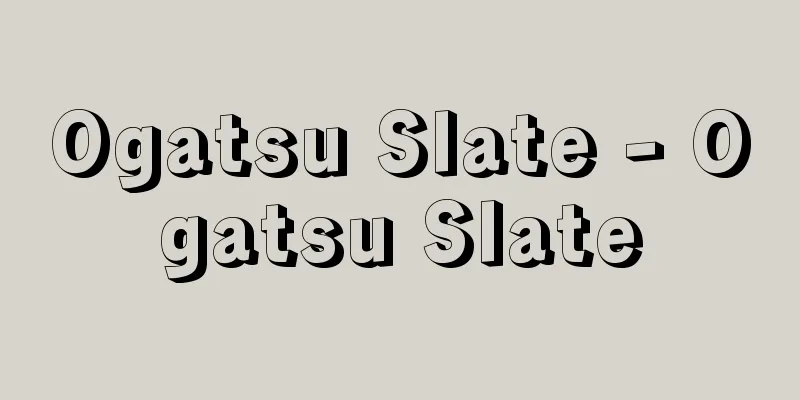Parliament - ぎkai (English spelling) parliament English

|
A parliament is a representative body of the people in a democratic nation. It is also known as the legislative branch, and its main power is law-making. However, because it is a representative governing body, it has many important powers regarding national affairs in addition to legislative power, and parliament occupies a position as the highest organ of state power. [Hiroshi Tanaka] Origin and Development of ParliamentParliaments originally had their origins in the assemblies of estates (estate assemblies) that arose in the womb of medieval feudal society. However, the establishment of modern parliaments was triggered by the Glorious Revolution in England (1688), and this is why England is known today as the mother of democratic politics. Since then, other countries around the world have modeled their democracies on the British parliamentary system and the reality of parliamentary politics. It was as far back as 1295 that representatives of the feudal estates in Great Britain (then England) convened for the first time in a bicameral (two houses) system consisting of the House of Lords (monks and nobles) and the House of Commons (knights and citizens). The reason that this parliament is known in history as the "Model Parliament" is likely due to the national representative character seen in its composition. The establishment of a parliament with such characteristics prepared the conditions for the birth of a modern state in England two centuries earlier than in other countries. The progress of parliamentary politics, on the one hand, allowed the king to govern while grasping the political situation of the whole of England, and to establish a system in which the government could be run by widely collecting taxes from the common people, paving the way for the establishment of political integration and financial foundations, which were the conditions for a modern nation-state. On the other hand, the development of parliamentary politics fostered the idea of the "rule of law" in England, which states that the king should govern by respecting the will of Parliament and the laws (statutory laws) enacted by Parliament, and when this idea of the "rule of law" was later combined with national sovereignty, a modern democratic state was established. In fact, in England, during the 14th and 15th centuries, Parliament acquired the status of a legislative body and grew to the point of asserting the right to tax in the form of "no taxation without consent." Through the two revolutions of the Puritan Revolution (1640-60) and the Glorious Revolution, England created the prototype of the modern democratic state centered on Parliament for the first time in the world. The significance of the Glorious Revolution, as theorized by Locke in his Two Treatises of Government (1690), is that, first, it established the status of Parliament, the legislative body, as the highest organ of state power, second, it determined the superiority of the legislative branch over the executive branch in the relationship between Parliament and the King, and third, it realized in the political system the idea that bad governing institutions (whether legislative or executive) can be changed. It can be said that the rule of political management that the Cabinet is responsible to the Diet when conducting politics, and therefore the principle of popular sovereignty, which means that if the Cabinet loses the confidence of the Diet, it must resign en masse or dissolve Parliament and ask the people, as sovereigns, to make a decision, and the prototype of the parliamentary cabinet system based on a system of cabinet responsibility and dissolution system, all appeared around this time. Subsequently, during the 18th century, the executive power of the King was transferred to the hands of a cabinet made up of members of Parliament. As a result of efforts to expand the right to vote that began in the mid-18th century, universal and equal suffrage for adult men and women was finally implemented in 1928. Furthermore, it was established (1911) that the powers of the House of Commons, composed of elected members, are absolutely superior to the powers of the House of Lords, composed of unelected members. As a result, parliamentary politics and democracy in Britain steadily expanded. [Hiroshi Tanaka] Parliament and DemocracyBy the way, why has the parliament gained the status and reputation to be called the highest governing body and the best form of government in a modern state? The first thing that comes to mind is that the parliament appeared during the civil revolution, with the lofty ideal of representing the people. Hobbes and Locke, the greatest thinkers during the English Revolution, developed the idea of the so-called "social contract," which states that the supreme power of the state resides in the legislative power, and that the people's representatives with legislative power (called the sovereign in Hobbes) and the legislative body (Parliament in Locke) were established with the consent of the people. This idea denied rule by the arbitrary will of the king = "rule of men," and asserted rule by laws established by the people's representatives = "rule of law," and this is where the representative character of the British Parliament was theorized. However, even with the victory of the civil revolutions in England and France, the right to vote and to be elected was still limited to a small number of "proper and educated people" (M. Weber). For this reason, Paine criticized the undemocratic nature of the British Parliament in Common Sense (1776), and Bentham and Mill also called for the expansion of the right to vote and the realization of universal suffrage. Since the 19th century, efforts have been made to realize this issue in various countries, and by the mid-20th century, universal suffrage was implemented, and parliaments finally acquired a truly representative character of the people. Thus, today, democratic politics is identified with parliamentary politics. Next, the reason why parliaments have been welcomed as an institution suited to modern democratic nations is that representatives of the people in parliament decide on the outlines of legislation and policies through repeated "deliberations" and "debates," and that parliamentary democracy institutionally guarantees that these "deliberations" and "debates" are "open" to the people. In the era of absolute monarchies, political decisions were almost always made by the arbitrary will of the king, and these decisions were naturally made in secret. Therefore, it is precisely the principles of parliamentary politics - "debate" and "openness" - that are in line with the spirit of modern democratic politics, which is based on "freedom of speech" and public participation in politics, and this is the reason why parliamentary systems have taken root in many countries. [Hiroshi Tanaka] Criticism of parliamentary politicsAs mentioned above, in modern times, the development of democratic politics through the institutional establishment of parliaments has become a common goal in all countries, but parliamentary politics has not been without criticism since the establishment of modern parliaments. At first, it was argued that the composition of parliaments lacked the character of representing the people. In the era of limited suffrage, those represented in parliaments were limited to the propertied classes. As a result, parliaments were criticized for merely representing special interests, and for this reason, Rousseau stated in The Social Contract (1762) that the "general will" (national interest) could not be represented by anything, criticized the state of parliaments at the time under the limited suffrage system, and put forward the idea of popular sovereignty. Such dissatisfaction with parliaments was later resolved through the expansion of suffrage. However, stronger criticism of parliamentary politics came from socialists who denounced the capitalist production system itself and demanded its change. Although the right to vote was gradually expanded from the 19th century to the beginning of the 20th century, most of the political parties that held the majority in national parliaments and took power were pro-capitalism. Therefore, socialists defined parliament as an institution that served the interests of the bourgeoisie and an instrument of class rule, and argued that it was necessary to overthrow it and build a completely new political system. Therefore, the method of selecting representatives and running politics seen in the highest decision-making bodies such as the Supreme Soviet of the Soviet Union and the People's Congress of China is very different from the parliamentary system of capitalist countries. Here, delegates are recommended by labor unions, agricultural organizations, cultural organizations, etc., and cannot run freely. In addition, politics is run by a single party, the Communist Party, rather than a multi-party system. This is based on the idea that a single party system is better if a truly representative governing body is to be elected. Therefore, in today's world, two political systems coexist: the parliamentary system and the socialist-type political system. Another criticism of parliamentary politics was made by the fascist states that emerged in Germany, Italy, Japan, and other countries in the 1920s and 1930s and collapsed at the end of World War II. These countries aimed to establish totalitarian authoritarian states to counter the Western powers on the one hand and the threat of Soviet socialism on the other. In fascist countries, an anti-parliamentary ideology arose, which argued that a parliamentary system that allowed the existence of socialist parties that intensified class conflict and disrupted national unity should be rejected. As an alternative to a parliamentary system, for example, German political scientist C. Schmidt advocated presidential dictatorship. He declared the parliamentary system dead, arguing that the principles of "debate" and "openness" of the parliamentary system had become a mere formality, and that important issues that would determine the fate of the nation were decided in advance in secret between big capitalists, upper-ranking bureaucrats, party leaders, and military leaders, making parliaments unnecessary. On the one hand, this criticism contained a valid criticism of modern parliamentary politics, but in fascist states, human rights were completely ignored in the name of national unity and militarism and aggression were promoted. The actions of these dictatorial states led to the outbreak of World War II, and the fascist states were eventually overthrown by many of the world's democratic nations. In response to the negative arguments against parliament put forward by socialists and fascists, there is the theory of social democracy proposed by British political scientist and Labour Party theorist Laski. Although he criticized the fact that parliaments often act according to the "logic of capital," he opposed the idea of building a new political system through violent revolution, arguing that it would involve too many sacrifices in countries where parliamentary politics had already been established to a certain extent, and he considered fascist dictatorships to be out of the question, and sought to reform parliament. He proposed that parliament, which currently represents special interests, should be restructured to serve the national interest by sending a large number of representatives with socialist reform ideas to parliament. In any case, after World War II, many countries that had experienced the struggle against fascism came to widely recognize that easily rejecting parliament could lead to dictatorship. This led to a change in the view of parliament among Communist parties in highly capitalist countries. Today, Communist parties around the world have abandoned their previous theories of violent revolution and proletarian dictatorship, and are pursuing a path to peaceful socialism within the framework of parliamentary democracy, while gaining the consent and support of the majority of the people. [Hiroshi Tanaka] Japanese ParliamentIn Japan, a parliamentary system was finally introduced with the promulgation of the Constitution of the Empire of Japan (1889, Meiji 22), about 20 years after the Meiji Restoration (1868). However, the Constitution adopted German-style monarchical leadership rather than British-style parliamentary democracy, and the Emperor was considered to be the ultimate holder of governing power, so the Imperial Diet was limited to the position of an institution supporting the Emperor's legislative power. In terms of the composition of the parliament, in addition to the popularly elected House of Representatives, there was also a non-elected House of Peers that restrained the actions of the House of Representatives, and the parliamentary cabinet system was not clearly stated in the constitution, so healthy parliamentary politics did not develop in Japan before World War II. However, in the postwar Japanese Constitution, which is based on the principle of popular sovereignty, the Emperor's position is defined as "the symbol of the State and of the unity of the Japanese people" (Article 1), and the Emperor no longer has any authority over national affairs. Instead, the National Diet (parliament) is placed in the position of "the highest organ of state power and the sole law-making organ of the State" (Article 41). In addition, the former undemocratic House of Peers was abolished, and both the House of Representatives and the House of Councillors are composed of representatives elected by the people, who have gained equal suffrage for men and women, and the parliamentary cabinet system was also clearly written into the Constitution. Thus, the Japanese parliament has a truly representative character, and its parliamentary politics are worthy of the name of parliamentary democracy. In addition, since the National Diet is the highest organ of state power, it has a wide range of powers over national affairs, including not only legislative power, but also powers over finances (such as voting on budgets and accounts, and taxation), the power to approve treaties, the power to supervise the executive branch (such as nominating the Prime Minister and passing a motion of no confidence in the Cabinet), the power to investigate national affairs, and the power to propose amendments to the Constitution. [Hiroshi Tanaka] Aiming to establish parliamentary governmentAs mentioned above, parliamentary politics in Japan has made great strides since the end of the war. However, many problems remain in terms of the actual running of politics. Parliamentary politics is run by "majority rule." The most important thing about this majority rule procedure is how thoroughly deliberations were carried out in parliament and how much respect was given to minority opinions. In other words, in politics of "numbers," it is not just the "quantity" that matters, but the "quality" of the issues. From this perspective, has it not been the case that important political decisions in postwar Japanese politics have often been made based on a formal "logic of numbers"? Another important point about parliamentary politics is whether the will of the people is adequately reflected in the parliament. In this regard, too, it seems that Japanese parliamentary politics tends to be run without the people's participation. Rousseau once said that the English may think that they are free, but that is only during elections, and that they are slaves at other times, sharply criticizing the disconnect between the "Parliament" and the "people" in England. Therefore, if formal "rule of the numbers" continues to run rampant in Japanese parliamentary politics and "politics without the people" continues in this state, then in the name of parliamentary democracy, the Japanese people will in fact be slaves, and the principle of popular sovereignty will become a mere formality. [Hiroshi Tanaka] "Hiroshi Tanaka, Introduction to the Study of Hobbes: The Birth of the Theory of the Modern State" (1982, Ochanomizu Shobo) " "C. Schmitt, Translated by Hiroshi Tanaka and Takeo Harada, "Presidential Dictatorship" (1974, Miraisha) " "Hiroshi Tanaka, Carl Schmitt" (1992, Miraisha)" [References] | | | | | |Source: Shogakukan Encyclopedia Nipponica About Encyclopedia Nipponica Information | Legend |
|
民主主義国家における国民代表的性格をもつ会議体。議会は別名立法府(立法部)とよばれるように、その主たる権限は立法権にある。しかし、議会は国民代表的統治機関であるから、立法権のほかにも、国政に関する多数の重要な権限をもち、議会はいわば国権の最高機関としての地位を占めている。 [田中 浩] 議会の起源と発達議会はもともとは中世封建社会の胎内で生まれた等族会議(身分制議会)にその起源をもつ。しかし、近代議会の成立はイギリスの名誉革命(1688)を契機とし、今日イギリスが民主政治の母国とよばれる理由もここにある。以後、世界の他の国々はこのイギリスの議会制度や議会政治の実際を模範として民主主義国家を形成していく。 イギリス(当時はイングランド)で封建諸身分の代表が貴族院(僧侶(そうりょ)・貴族)と庶民院(騎士・市民)という二院(両院)制の形をとって初めて招集されたのは、遠く1295年のことである。このときの議会が史上、「模範議会(モデル・パーラメント)」とよばれるのは、その議会の構成にみられる国民代表的性格のゆえにであろう。 ところで、このような性格をもつ議会が設立されたことは、後のイギリスにおいて、他の国々よりも2世紀も早く近代国家が生まれる条件を準備するものとなった。なぜなら、議会政治の進行は、一方で国王がイギリス全体の政治状況を把握しつつ政治を行い、また庶民身分から広く税を徴収して政治を運営するシステムの成立を可能にし、それは近代国民国家の条件たる政治的統合と財政的基盤の確立へと向かう道を掃き清めるものとなったからである。他方で、議会政治の発展は、国王が議会の意志や議会で制定された法律(制定法)を尊重して統治すべしという「法の支配」の思想をイギリスで育成せしめ、そしてこの「法の支配」の観念がのちに国民主権主義と結び付いたときに近代民主主義国家が成立することになったからである。 事実、イギリスにおいては、14~15世紀の間に、議会は、立法機関としての地位を獲得し、また「承諾なければ課税なし」という形で課税権を主張するまでに成長した。そして、ピューリタン革命(1640~60)と名誉革命の二つの革命を通じて、イギリスは世界で初めて議会を中心とする近代民主主義国家の原型をつくりあげた。名誉革命の意義は、ロックがその『政治二論』(1690)において理論化したように、一つは、立法機関たる議会を国権の最高機関としての地位につけたこと、二つには議会と国王との関係において、立法部の行政部に対する優位を決定づけたこと、三つには悪い統治機関(立法部であれ行政部であれ)は変更してもよい、という考え方を政治制度のうえで現実化したことにある。内閣が議会に責任を負って政治を行うという政治運営上のルール、したがって議会の信任を失えば内閣は総辞職するか、議会を解散するかして主権者である国民の判断を問う、という国民主権の原理や、責任内閣制・解散制度を軸とする議院内閣制の原型は、ほぼこの時期に登場したものとみてよいだろう。 そして、その後、18世紀中に国王のもつ行政権が、国会議員から構成される内閣の手中に移行したことにより、また18世紀中ごろ以降に始まった選挙権拡大の努力の結果、ついに1928年に成年男女の普通平等選挙制が実施されたことにより、さらには、民選議員からなる下院(庶民院)の権限が、非民選議員からなる上院(貴族院)の権限に対して絶対的に優越することが確定(1911)したことにより、イギリスの議会政治と民主政治は着実に伸張していったのである。 [田中 浩] 議会と民主政治ところで、議会が近代国家における最高の統治機関、最良の政治形態といわれるまでの地位と評価を獲得するに至った理由は何か。まず第一に考えられる点は、議会が市民革命期に国民代表の理念を高く掲げて登場したことによる。 イギリス市民革命期における最大の思想家ホッブズやロックは、国家の最高権力は立法権のなかにあり、また、立法権をもつ国民の代表者(ホッブズでは主権者とよばれている)や立法機関(ロックでは議会)の設立に際しては国民の同意があったといういわゆる「社会契約」の考え方を展開している。そして、この思想こそ、国王の専断的意志による統治=「人の支配」を否定して、国民代表の制定した法による統治=「法の支配」を主張したものであり、ここにイギリス議会の国民代表的性格が理論化されたのである。 もっとも、イギリスやフランスの市民革命の勝利によっても、なお、選挙・被選挙権の資格は一部の「財産と教養ある人々」(M・ウェーバー)に限定されていた。そのため、ペインは『コモン・センス』(1776)においてイギリス議会の非民主的性格を批判したし、ベンサムやミルも選挙権の拡大や普通選挙権の実現を主張したのであった。そして、この問題は、19世紀以降、各国でその実現のための努力が続けられ、20世紀中葉ごろまでに普通選挙制が実施されることによってようやく議会は真に国民代表的性格を獲得するに至り、こうして現在では民主政治といえば議会政治と同一視されるまでになった。 次に、議会が近代民主主義国家に適合的な制度として歓迎された理由は、議会の場において国民代表が「審議」「討論」を重ねて立法・政策の大綱を決定し、またその「審議」「討論」のプロセスが国民に対して「公開」されるということを議会制民主主義が制度的に保障したためである。絶対王制の時代には、政治的決定はほとんど国王の専断的意志により、またその決定は当然に秘密裏になされた。したがって、この「討論」と「公開」という議会政治の原理こそ、「言論の自由」や国民の政治参加を基調とする近代民主政治の精神と合致するものであり、各国において議会制度が定着していった理由はここにある。 [田中 浩] 議会政治に対する批判以上に述べたように、近代以降、各国において議会の制度的確立による民主政治の発展がその共通の目標となったが、近代議会の成立当初から議会政治に対する批判がないわけではなかった。初めは、議会の構成が国民代表的性格を欠く、というものであった。制限選挙の時代には、議会に代表される者たちは有産者層に限られていた。そこで、議会は特殊利益を代表しているにすぎないと非難され、このためルソーは『社会契約論』(1762)において、「一般意志」(国民的利益)はなにものにも代表されえないと述べ、制限選挙制下にある当時の議会のあり方を批判し、人民主権的考え方を提起したのである。このような議会に対する不満は、その後、選挙権の拡大を通じてその解決が図られていく。 しかし、議会政治に対するより強力な批判は、資本主義的生産方式それ自体を非難し、その変更を迫った社会主義者たちの間からおこった。19世紀から20世紀初頭にかけてしだいに選挙権が拡大されたにもかかわらず、各国議会で多数を占め政権を担当した政党はほとんど資本主義擁護の立場をとる政党であったから、社会主義者たちは、議会はブルジョア階級の利益を図る機関、また階級支配の道具であると規定し、それを打倒してまったく新しい政治形態を構築する必要がある、と主張したのであった。そのためソ連の最高会議(ソビエト)、中国の人民代表大会などの最高議決機関にみられる代表選出や政治運営の方式には、資本主義国家の議会制度とはきわめて異質なものがある。ここでは、代議員は、労働組合、農業団体、文化団体などから推薦され、自由に立候補することはできない。また、複数政党制によらず共産党一党による政治運営が行われている。これは、真に国民代表的な統治機関が選出されるならば一党制のほうがよい、という考え方にたつものといえよう。したがって、今日の世界では、議会制度と社会主義型政治制度の二つの政治制度が併存しているのである。 議会政治に対するもう一つの批判は、1920~30年代にドイツ、イタリア、日本などに出現し、第二次世界大戦の終結によって崩壊したファシズム国家の側からなされた。これらの国々は、一方では欧米列強に対抗し、他方ではソビエト社会主義の脅威に対処するために、全体主義的な権威国家の確立を目ざした。そこで、ファシズム国家においては、階級対立を激化させ国家的統一を乱す社会主義政党の存在を許しているような議会制度は否定されるべきであるという議会敵視の思想が台頭した。そして、議会制にかわるものとしては、たとえばドイツの政治学者C・シュミットは大統領の独裁を主張している。この際、彼は、「討論」と「公開」という議会制の原理はもはや形骸(けいがい)化し、国民の運命を決定するような重要問題は、大資本家、上層官僚、政党幹部、軍幹部の間で事前に秘密裏に決定されているから、議会は無用であるとして議会制度に死亡宣告を下したのである。この批判は、一面では現代議会政治に対する正しい批判を含んでいたが、ファシズム国家においては国家的統一という名目の前に人権がまったく無視され、軍国主義と侵略主義が鼓吹されたため、これらの独裁国家の行動は第二次大戦勃発(ぼっぱつ)の因となり、結局、世界の多くの民主主義国家によってファシズム国家は打倒された。 こうした社会主義やファシズムの側から提出された議会否定論に答えるものとしては、イギリスの政治学者でかつイギリス労働党の理論家でもあったラスキの社会民主主義論がある。彼は、議会が多くの場合「資本の論理」によって行動している事実を批判しながらも、議会政治が、かなりの程度定着した国々においては、暴力革命によって新しい政治制度を構築することには犠牲が多すぎるとして、ましてやファシズム的独裁国家は論外としてこれに反対し、議会改革の方向を模索している。そして、議会に社会主義的改革思想をもった多数の代表者を送り込むことによって、特殊利益を代弁している議会を、国民的利益に奉仕させるように構造転換すべきであると提案しているのである。 いずれにせよ、ファシズムとの闘争を経験した第二次大戦後の各国においては、安易な議会否定は独裁制を招く危険性があるという認識が広範に生まれた。このことは、高度に資本主義が発達した国々における共産党の議会観にも変化を与えることになった。そして今日では、各国共産党は、かつての暴力革命論やプロレタリアート独裁論を放棄して、国民多数の同意と支持を獲得しつつ、議会制民主主義の政治運営の枠のなかで平和的に社会主義への道を実現していく方向を追求している。 [田中 浩] 日本の議会日本においては、明治維新(1868)後20年ほど経過したのち、大日本帝国憲法発布(1889=明治22)とともにようやく議会制度が導入された。しかし、大日本帝国憲法では、イギリス型議会制民主主義よりもドイツ型君権主導主義を採用し、天皇が統治権の総攬(そうらん)者であるとされていたため、帝国議会は天皇の立法権を協賛する機関という地位にとどめられていた。また議会の構成についても、民選の衆議院のほかに、衆議院の行動を抑制する非民選の貴族院が設けられ、また議院内閣制も憲法上、明文化されていなかったため、第二次大戦前の日本では健全な議会政治が発達しなかった。 しかし、戦後の国民主権主義にたつ日本国憲法では、天皇の地位は「日本国の象徴であり日本国民統合の象徴」(1条)とされ、天皇は国政に関する権限はもたなくなり、かわって国会(議会)が「国権の最高機関であって、国の唯一の立法機関」(41条)としての地位についた。また、かつての非民主的な貴族院は廃止され、衆議院と参議院はいずれも、男女平等の普通選挙権を獲得した国民によって選出された代表者から構成され、議院内閣制も憲法上、明文化された。ここに日本の議会は真に国民代表的性格を備え、その議会政治も議会制民主主義の名に値するものとなった。なお、国会は国権の最高機関であるから、立法権だけではなく、財政に関する権限(予算・決算の議決、課税に関する議決など)、条約承認権、行政部監督権(内閣総理大臣の指名、内閣不信任決議権など)、国政調査権、憲法改正発議権など、国政に関する広範な権限をもっている。 [田中 浩] 議会政治の確立を目ざして以上に述べたように、戦後、日本の議会政治は大きく発展した。しかし、実際の政治運営の面ではいまだに数多くの問題点が残されている。議会政治は「多数決制」によって運営される。この多数決の手続においてもっとも肝要なことは、議会においてどこまで十分な審議が尽くされ、またその際、少数意見がどれほど尊重されたか、という点にある。つまり、「数」の政治においては、「量」の多少だけでなく、その「質」の高さが問題なのである。この点からみるとき、戦後日本の政治においては、とかく形式的な「数の論理」によって重要な政治決定がなされてこなかったであろうか。 また、議会政治に関してもう一つ重要なことは、議会に国民の意志が十分に反映されているかどうかという点である。これについても日本の議会政治は国民不在のところでその運営がなされている傾向が強いように思われる。かつてルソーは、イギリス人は自由であると思っているかもしれないが、それは選挙のときだけであって、それ以外のときには奴隷状態に置かれていると述べて、イギリスの「議会」と「国民」との間の断絶状態を痛烈に批判している。したがって、日本の議会政治においても、形式的な「数の支配」が依然として横行し、「国民不在の政治」がこのままの状態で続くときには、議会制民主主義の名のもとで、実は日本国民は奴隷状態に置かれていることになり、国民主権主義の原理は形骸化することになろう。 [田中 浩] 『田中浩著『ホッブズ研究序説 近代国家論の生誕』(1982・御茶の水書房)』▽『C・シュミット著、田中浩・原田武雄訳『大統領の独裁』(1974・未来社)』▽『田中浩著『カール・シュミット』(1992・未来社)』 [参照項目] | | | | | |出典 小学館 日本大百科全書(ニッポニカ)日本大百科全書(ニッポニカ)について 情報 | 凡例 |
<<: Parliamentary committee system
>>: Machine - Kikai (English spelling) machine
Recommend
Ito Cells - Ito Cells
...Since then, the cells that feed on foreign sub...
Otomo Muroya
A powerful figure in the Yamato government from t...
Semi-voiced consonant - Handakuon
The name given to the consonants in the "pa&q...
Accounting book - Accounting book
(1) Ji-zhang A tax ledger from the Sui and Tang dy...
Schlusselgewald (English spelling) Schlusselgewald
…In the late Middle Ages in Germany, after the ti...
Reservation
…Many of the European colonists in North America ...
Montego Bay (English spelling)
A resort city in the northwest of Jamaica in the C...
Uneme Takeyoshi - Uneme no Chikura
…This stone monument was made in 689 (the 3rd yea...
Metropolitan Life Insurance Co.
One of the top life insurance companies in the Uni...
Jean Allemane
1843‐1935 French socialist. In the 1860s, he was a...
Review - Revue (English spelling)
A stage performance consisting of dance, song, sk...
Lava - lava
It is also written as "lava". (1) The m...
Anatake - You
...The hosts of Polyporus polyporus are the trunk...
Tarry cyst (English spelling) Tarrycyst
...It can also spread through the bloodstream. Re...
Toyoyama [town] - Toyoyama
A town in Nishikasugai County, western Aichi Prefe...









